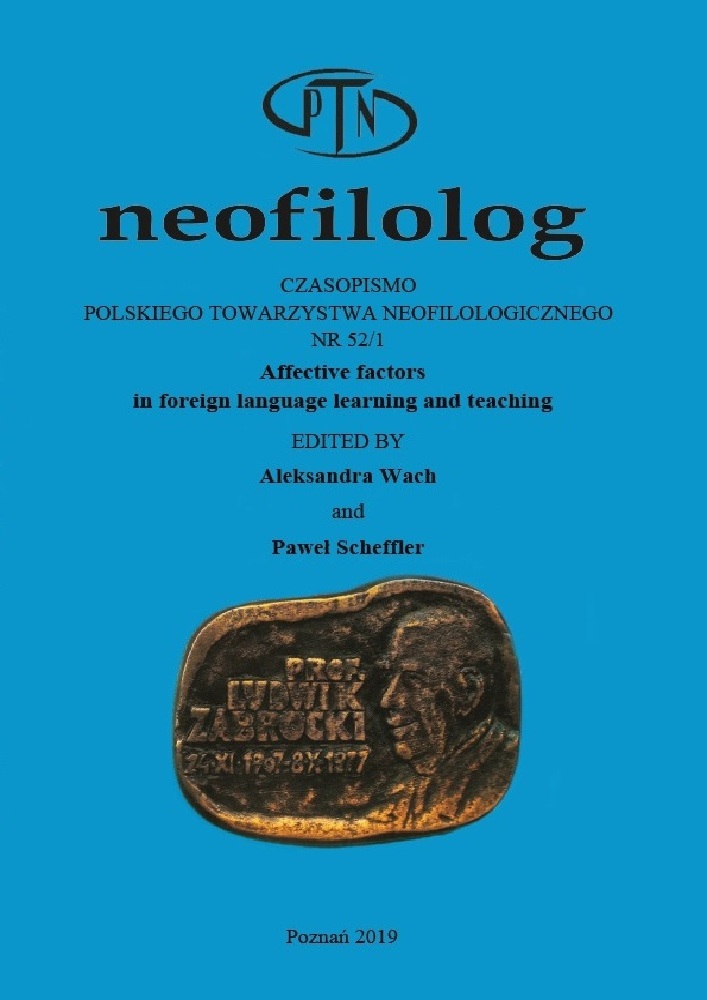Abstract
This article explores the concept of teacher professionalism, focusing primarily on factors motivating teachers to pursue professional development within the framework of formal, organized teacher development programmes offered by educational institutions. Its major purpose is to contribute to a better understanding of motivational issues involved in teacher education, or teacher learning, as it is sometimes referred to. Its other purpose is to liven up a discussion concerning language teacher education as a life-long experience. The article consists of two parts: its theoretical sections focus on the notions of professionalism and a professional, together with the concepts of autonomy and reflection/reflective practice, which are crucial from the point of view of teacher development. Next, factors motivating teachers to continue their development both as professionals and as individuals are addressed. The second part present and discusses results of a small-scale individual research project which yielded some interesting data pertaining to motivational issues involved in teacher learning.
Literaturhinweise
Bailey K.M., Curtis A., Nunan D. (2001), Pursuing professional development. Boston, Mass.: Heinle & Heinle.
Breen M.P., Mann S.J. (1997), Shooting arrows at the sun: perspectives on a pedagogy for autonomy (in) Benson, P., Voller, P. (eds.), Autonomy and Independence in Language Learning. London/New York: Longman, pp. 132-149.
Edwards C. (1996), Learning to learn how to teach: developing expertise through experience (in) Willis, J., Willis, D. (eds.), Challenge and change in language teaching. Oxford: Heinemann, pp. 99-107.
Finocchiaro M. (1988), Teacher development: a continuing process (in) “English Teaching Forum”, No 26, pp. 2-5.
Harmer J. (1998), How to teach English. Harlow, Essex: Longman.
Hirschhorn S. (2011), Initial teacher training 1 (in) “English Teaching Professional”, July, Issue 75, pp. 50-52.
Hirschhorn S. (2011), Initial teacher training 2 (in) “English Teaching Professional”, September, Issue 76, pp. 48-51.
McGrath I. (2000), Teacher autonomy (in) Sinclair B., McGrath I., Lamb T. (eds.), Learner autonomy, teacher autonomy: Future directions. Harlow: Longman, pp. 100-110.
Lange D.L. (1990), A blueprint for a teacher development program (in) Richards J.C., Nunan D. (eds.), Second Language Teacher Education. Cambridge: Cambridge University Press, pp. 245-268.
Little D. (1995), Learning as dialogue: the dependence of learner autonomy on teacher autonomy (in) “System”, No 23, pp. 175-182.
Richards C.J., Farrell, T.S.C. (2005), Professional development for language teachers. Strategies for teacher learning. Cambridge: Cambridge University Press.
Richards J.C., Nunan D. (eds.) (1990), Second language teacher education. Cambridge: Cambridge University Press.
Smith R. (2000), Starting with ourselves: teacher-learner autonomy in language learning (in) Sinclair B., McGrath I. and Lamb T. (eds.), Learner autonomy, teacher autonomy: Future directions. Harlow: Longman, pp. 89-99.
Tort-Maloney D. (1997), Teacher autonomy: a Vygotskian theoretical framework. CLCS Occasional Paper no. 4. Trinity College, Dublin: Centre for Language and Communication Studies.
Ur P. (1997), The English teacher as professional (in) “English Teaching Professional”, July, Issue 8, pp. 3-5.
Ur P. (1998), Distinctions and dichotomies – teacher training, teacher development (in) “English Teaching Professional”, January, Issue 2. 21.
Williams M., Burden R.L. (1997), Psychology for language teachers. Cambridge: Cambridge University Press.
Willis J., Willis D. (eds.) (1996), Challenge and change in language teaching. Oxford: Heinemann.
Werbińska D. (2011), Developing into an effective teacher of English. Słupsk: Wydawnictwo Naukowe Akademii Pomorskiej w Słupsku.
Zawadzka E. (2004), Nauczyciele języków obcych w dobie przemian. Kraków: Oficyna Wydawnicza „Impuls”.
Lizenz
Copyright (c) 2019 Neofilolog

Dieses Werk steht unter der Lizenz Creative Commons Namensnennung - Keine Bearbeitungen 4.0 International.
Autoren:
Die Autoren der zur Veröffentlichung in der Zeitschrift Neofilolog angenommenen Texte sind verpflichtet, den Vertrag über die Erteilung einer kostenlosen Lizenz für die Werke mit der Verpflichtung zur Erteilung einer Sublizenz CC auszufüllen, zu unterzeichnen und an die Adresse der Redaktion zurückzusenden.
Gemäß Vertrag erteilen die Autoren auf die in der Zeitschrift Neofilolog veröffentlichten Texte der Adam-Mickiewicz-Universität in Poznań eine nicht exklusive und kostenlose Lizenz und erlauben die Verwendung der Sublizenz Creative Commons Attribution-NoDerivatives 4.0 International (CC BY-ND 4.0).
Die Autoren behalten das Recht zur weiteren freien Verfügung über das Werk.
Benutzer:
Interessierte Onlinebenutzer dürfen die seit 2017 veröffentlichten Werke unter folgenden Bedingungen nutzen:
- Anerkennung der Urheberschaft - die Verpflichtung, zusammen mit dem verbreiteten Werk Informationen über die Urheberschaft, den Titel, die Quelle (Links zum Originalwerk, DOI) und die Lizenz selbst bereitzustellen;
- ohne Schaffung abgeleiteter Werke - das Werk muss in seiner ursprünglichen Form erhalten bleiben, ohne Zustimmung des Autors dürfen keine Studien, beispielsweise Übersetzungen, verbreitet werden.
Die Urheberrechte aller veröffentlichen Texte sind vorbehalten.
Sonstige:
Die Adam-Mickiewicz-Universität in Poznań behält das Recht auf die Zeitschrift als Gesamtheit (Layout, Grafik, Titel, Umschlagsprojekt, Logo usw.).

